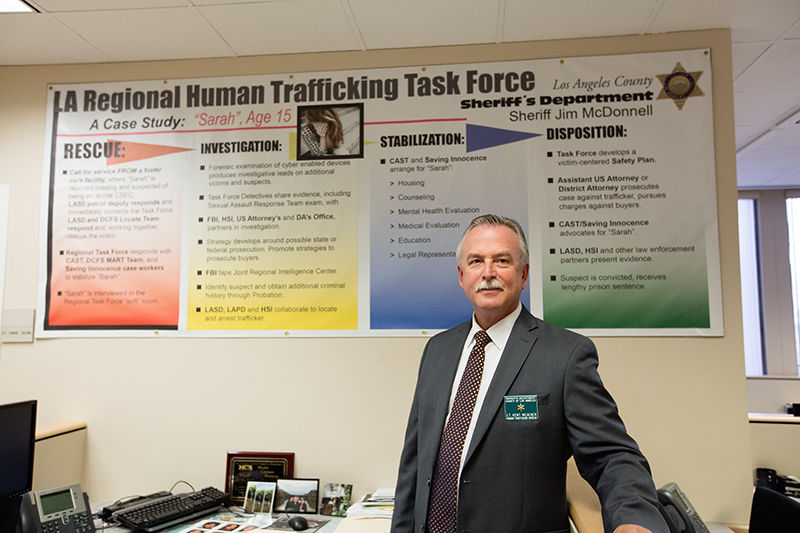Last November, Los Angeles County Sheriff Jim McDonnell announced the formation of a human trafficking task force. It would be made up of not only officers from law enforcement agencies, such as the Sheriff’s Department, Los Angeles County district attorney’s office and FBI, but also social service agencies like partner CAST (Coalition to Abolish Slavery & Trafficking).
And McDonnell made clear the task force will focus on traffickers and johns who recruit and exploit minors.
The special unit takes up a whole floor in the sheriff’s facility in Monterey Park. During a tour, recently retired Capt. Merrill Ladenheim, who helped create the task force, told Angelus News it has a three-pronged approach. The first is to identify and rescue victims, who are often hidden. “Many of our victims of sexual exploitation are now online,” he pointed out. “So identifying them has gone from sidewalk to cyber. Then to rescue and surround them with services.
“Then we have our traffickers. We focus on arresting traffickers, gathering information and evidence, and treating them as the child molesters they are if it involves a juvenile. And then the third prong of this is the buyer, who’s creating the demand for this economy,” he added. “And we have very aggressive supply-demand operations where we target buyers of both children and adults.”
The task force has a mobile response team that responds day or night within 90 minutes. It operates under what’s called the “First Responders Protocol,” which means the team, made up of CAST workers and law enforcement personnel, will not only evaluate a victim but also take care of that victim.
“We don’t arrest juvenile victims of sexual abuse anymore,” said Ladenheim. “Our goal is not to do that. Sometimes we can’t help it if there’s a warrant for their arrest by a judge. But rather we try to place them, stabilize them, get them into services.”
Later on the tour of the open-cubical, bullpen-style floor, with officers facing each other behind computer screens, the on-site CAST person led me to the “soft room,” where kids are interviewed. They can cuddle up with a blanket, play with stuffed Teddy Bears and Mickey Mouses plus pet therapy dogs while talking to investigators or workers from CAST.
“Sometimes we can get children to talk about their abuse, where they wouldn’t in a sterile police station,” said Becca Channell, CAST task force coordinator. “And it [sex trafficking] isn’t going away. No, it’s only increased. We tend to have a wait list for clients to get services. And so we’re growing more and more to meet that demand.
“More young people are feeling comfortable with coming out with their stories and to get access to services. And then because we have these partnerships now with the Sheriff’s Department and other law enforcement, we have more people in the community calling into our hotline as well.”
For a more in-depth look at human trafficking in Los Angeles County read this accompanying article Inside the Life: A closer look at sex trafficking in Los Angeles.

